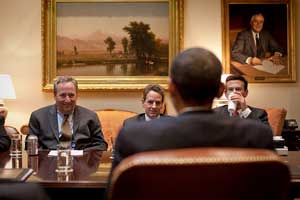Rep. Collin Peterson (D-Minn.), the chair of the House Agriculture committee, is sponsoring an amendment to his own legislation that’s supposed to regulate derivatives, the often-complex financial products that many people believe bear some of the blame for the financial crisis. Well, the guy who’s regulating derivatives knows best how to improve that regulation, right? Not according to the Project on Government Oversight, a Washington watchdog group, which has written a damning letter to Peterson arguing that his amendment would actually blow a big loophole in the rules. Here’s an excerpt:
The consequences of acquiescing to an unregulated and secretive over-the-counter (OTC) derivatives market became painfully clear last fall, when AIG nearly went under after it was suddenly forced to post collateral on its credit default swaps, and had to be bailed out with billions of dollars in government assistance.
We recognize that legislation approved by your Committee would begin to address these concerns by, for instance, creating new rules for margin and capital requirements. Unfortunately, the definition of an “alternative swap execution facility” described in Chairman Peterson’s amendment creates a wholly unjustified loophole in the regulation of OTC derivatives, effectively undermining the spirit of your legislation and representing a giant step backwards for transparency and accountability.
Journalist Andrew Cockburn has provided a clear and concise analysis showing how Chairman Peterson’s amendment creates this dangerous loophole. Under this amendment—which was adopted by voice vote with little debate—an “alternative swap execution facility” is simply defined as anything that “facilitates” swap trades. Such a facility would not be subject to the requirements of an actual exchange, thereby avoiding the new requirements for increased transparency and accountability. The specific authorization of voice brokerages is singularly troubling since it permits dealers to set prices that are not publicly disclosed.
We believe that the creation of this loophole is contrary to the avowed purpose of the bill. It will inevitably lead to the same kind of trading that created the financial crisis; it will undermine the transparency requirements that are needed to protect the public from fraud and manipulation; and it is inconsistent with confining financial trading, to the greatest extent possible, to well-regulated clearing houses.
A House committee using an unrecorded voice vote to approve an industry-supported amendment that guts its own—already weak—legislation: just another day on Capitol Hill.















